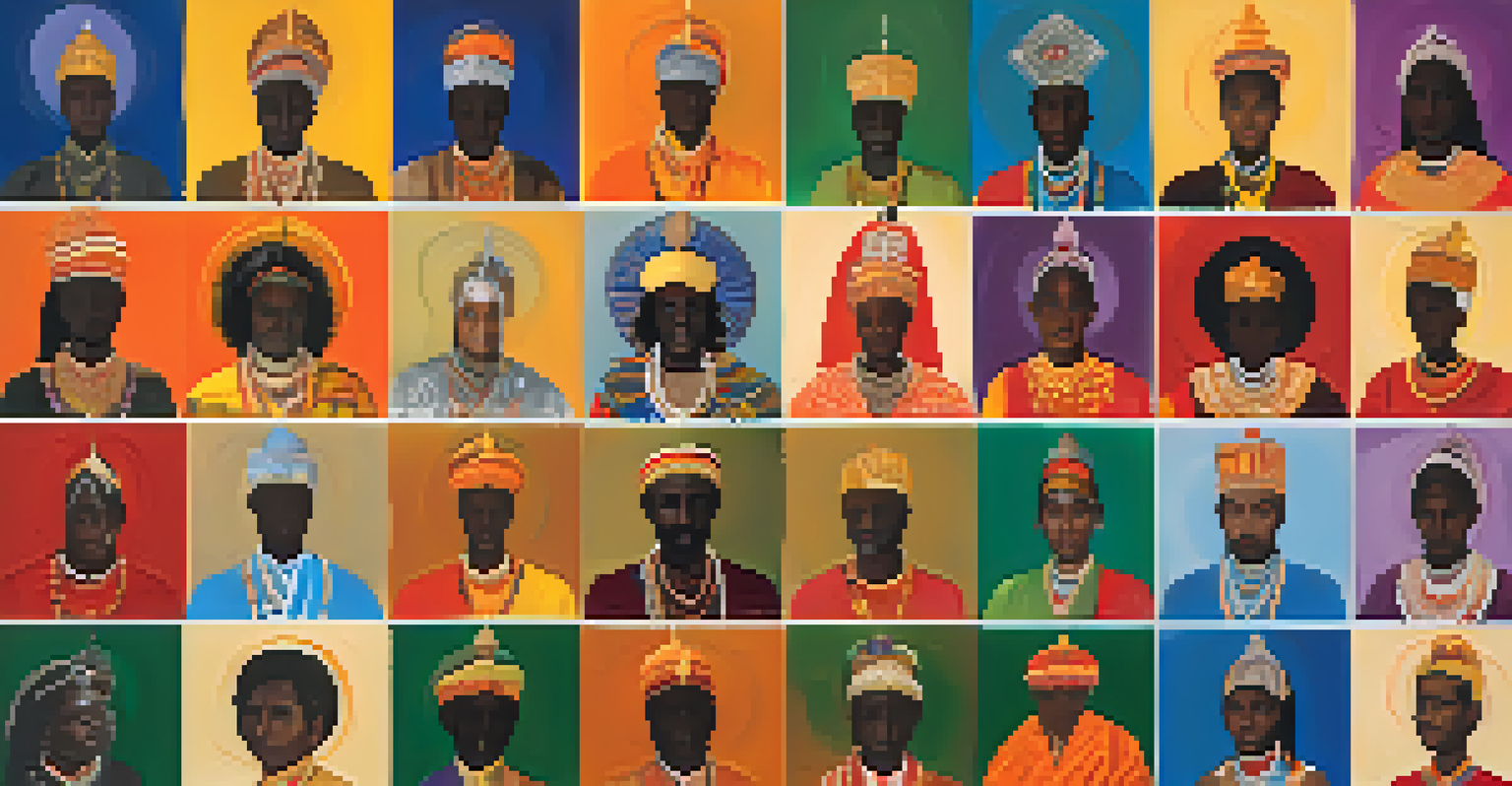The Spiritual Importance of Naming Ceremonies in Cultures

The Essence of Naming Ceremonies Across Cultures
Naming ceremonies are pivotal rituals that mark the introduction of a new life into a community. They often symbolize the hopes and dreams parents have for their child, intertwining personal identity with cultural heritage. In many societies, the chosen name carries deep spiritual significance, reflecting the beliefs and values of the family and community.
Names are the sweetest and most important sound in any language.
For instance, in many African cultures, names are believed to hold power and influence one’s destiny. The act of naming is not merely a formality, but a sacred tradition that connects the child to ancestors and cultural history. This connection fosters a sense of belonging and continuity within the community.
Across various cultures, the ceremony often involves blessings, rituals, and sometimes elaborate celebrations. This not only emphasizes the importance of the name but also integrates the child into the social fabric of their society, ensuring they are welcomed and supported as they grow.
The Spiritual Significance of Names
Names often carry spiritual weight, believed to embody the essence of a person. In many Indigenous cultures, for example, names are derived from nature, reflecting spiritual connections to the land, animals, and elements. This belief suggests that names are not just labels but gateways to understanding one’s identity and purpose within the universe.

Consider the practice among some Native American tribes, where a name might change throughout a person’s life, reflecting their journey and growth. This dynamic approach to naming underscores the belief that one’s identity is fluid and influenced by experiences and spiritual encounters. It's a reminder that names can shape, but also be shaped by, the individual’s life path.
Cultural Significance of Naming
Naming ceremonies connect personal identity with cultural heritage, symbolizing the hopes parents have for their children.
In many traditions, a name can also protect or empower the individual. This is evident in cultures where names are chosen to honor ancestors or deities, invoking blessings and strength. The spiritual resonance of a name can guide individuals, providing a sense of purpose and direction as they navigate life's challenges.
Rituals and Practices in Naming Ceremonies
Naming ceremonies often involve specific rituals that vary widely across cultures, reflecting unique beliefs and practices. For instance, in Hindu culture, the 'Namkaran' ceremony is an elaborate event where the name is chosen based on astrological charts, imparting a sense of cosmic alignment with the child’s future. Such rituals highlight the spiritual and communal aspects of naming.
A name is the first gift that a child receives from their parents, a reflection of their identity, hopes, and dreams.
In contrast, among Jewish communities, the 'Brit Milah' for boys and 'Simchat Bat' for girls mark the naming of the child with significant religious rituals. These ceremonies involve blessings and the sharing of the child’s name within the community, reinforcing the collective responsibility in nurturing the child’s spiritual growth.
Through these rituals, families not only express their hopes for their children but also invite their community to participate in their spiritual journey. This shared experience fosters a sense of unity and collective identity, emphasizing that individual names are part of a larger narrative within the culture.
Cultural Variations in Naming Practices
While the significance of naming ceremonies is universal, the practices surrounding them can be highly diverse. For example, in some African tribes, the naming ceremony occurs on the eighth day after birth, while other cultures may wait until a child reaches a certain age or milestone. These variations highlight different cultural attitudes towards life, identity, and spirituality.
In East Asian cultures, names may be selected based on their meanings and the characters used to write them, often reflecting virtues or aspirations. This illustrates how names can serve as a guiding principle for individuals, shaping their character and life choices. The thoughtfulness in choosing a name underscores its importance in cultural identity.
Community's Role in Celebrations
These ceremonies are communal events that emphasize shared responsibilities in raising a child and fostering social bonds.
The interplay between culture and naming practices reveals much about societal values. For instance, cultures that prioritize familial lineage may incorporate ancestral names, connecting children to their heritage. This practice not only honors the past but also instills a sense of responsibility to uphold family traditions.
The Role of Community in Naming Ceremonies
Naming ceremonies are not just family events; they are communal celebrations that strengthen social bonds. In many cultures, the community plays an integral role, providing support and blessings to the newborn. This collective participation emphasizes the notion that raising a child is a shared responsibility.
For instance, in some South American cultures, extended family and community members gather to participate in the ceremony, each contributing their wisdom and blessings. This involvement fosters a nurturing environment for the child, ensuring that they are surrounded by love and guidance from an early age.
The community’s role extends beyond the ceremony, as it continues to influence the child’s upbringing. This interconnectedness underscores the importance of social support systems in shaping identity and values, making the child’s name a reflection of not only individual identity but also collective heritage.
Naming Ceremonies in Modern Contexts
In today’s globalized world, naming ceremonies are evolving, blending traditional practices with modern influences. Families often incorporate elements from various cultures, creating unique ceremonies that reflect their diverse backgrounds. This fusion highlights the adaptability of naming traditions in contemporary society.
For example, many families may choose a name that honors both cultural heritage and modern trends, showcasing how naming can bridge generations. Social media has also played a role, as families share their ceremonies online, inspiring others and fostering a sense of global community around these rituals.
Evolving Naming Traditions
In a globalized world, naming ceremonies are blending traditional practices with modern influences, reflecting diverse backgrounds.
Despite the changes, the core essence of naming ceremonies remains intact: they celebrate identity, community, and spirituality. As families navigate their cultural landscapes, the significance of names continues to resonate, reminding us of the profound connections we share with one another.
The Future of Naming Ceremonies
As societies continue to evolve, the future of naming ceremonies is likely to reflect ongoing changes in cultural identity and values. With increasing recognition of diverse family structures and identities, we may see more inclusive naming practices that honor various backgrounds and experiences. This shift could lead to more personalized ceremonies that resonate deeply with contemporary beliefs.
Additionally, as global communication increases, cultures may influence each other in new ways, leading to innovative approaches to naming practices. This exchange can enrich the spiritual significance of names, allowing families to create meaningful connections that transcend geographical boundaries.

Ultimately, the future of naming ceremonies will likely remain rooted in the fundamental human desire to connect, celebrate, and honor identity. As we move forward, the act of naming will continue to serve as a powerful reminder of our shared humanity and the unique stories that each individual carries.